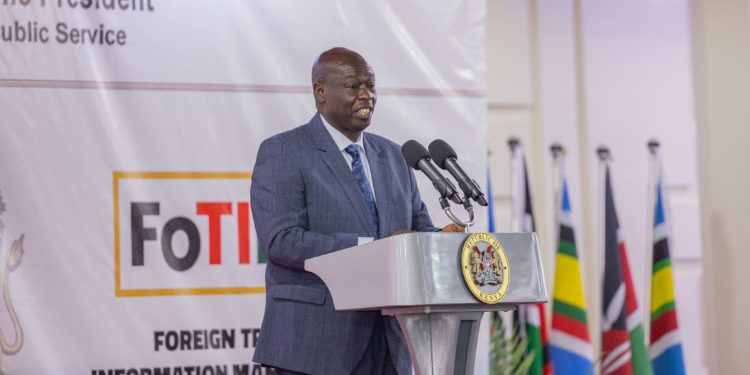Deputy President Rigathi Gachagua has officially launched two new digital platforms aimed at enhancing transparency, accountability, and efficiency in Kenya’s public sector.
Speaking at the Kenyatta International Convention Centre (KICC) in Nairobi, Gachagua unveiled the Presidential Directives Management Information System (PDMIS) and the Foreign Travel Information Management System (FOTIMS), which he described as critical tools for transforming governance.
“These systems will streamline the processes of implementing presidential directives and managing foreign travel requests,” Gachagua said. “They will also restore public trust by enhancing transparency and accountability in government operations.”
The Presidential Directives Management Information System (PDMIS) will track the issuance, implementation, and reporting of directives from President William Ruto. The system will replace manual methods with automated processes, allowing for efficient and transparent tracking of government orders. “The PDMIS will ensure that presidential directives are implemented expeditiously, without fail, and that any challenges encountered are promptly flagged and addressed,” Gachagua emphasized.
The Foreign Travel Information Management System (FOTIMS) aims to improve the efficiency of managing foreign travel requests by public servants. According to Gachagua, this system will automate the clearance process for official travel, ensuring compliance with public service guidelines and supporting the government’s austerity measures. “Foreign travel is a significant budget item, and while it is important for building networks and partnerships, it must be done sustainably and without abuse,” he noted.
The launch of these systems is part of the Kenya Kwanza administration’s broader effort to digitize government services, aligned with the Vision 2030 economic blueprint. Gachagua highlighted that the government has allocated KES 16.3 billion in the 2024/2025 financial year to support the digital transformation agenda, with a goal of making 80% of government services available online. “Technology is a strategic driver for not only improving efficiency in the public sector but also for making the government more transparent, trustworthy, and open,” he said.
Dr. Leah Kasera from the Office of the Head of Public Service provided further insights into the new platforms, stating that they were developed in-house by a team of young ICT officers with support from the ICT Authority. She described the PDMIS as a comprehensive tool for recording, tracking, and reporting on presidential directives, with features such as multi-level access rights, robust feedback mechanisms, and a centralized, secure storage system. “The PDMIS categorizes tasks into three stages—’to do,’ ‘doing,’ and ‘done’—to ensure effective monitoring and implementation,” Dr. Kasera explained.
Meanwhile, FOTIMS will enhance the efficiency of foreign travel management by centralizing the application, processing, and approval of travel requests. The system integrates with other government platforms, allowing real-time data access and secure communication, which will help in monitoring travel patterns and expenditures.
Gachagua commended the team of developers, stating, “I am proud that these systems were developed by young, innovative officers from the public service, demonstrating the immense talent within our ranks.”
He also urged all public servants to maintain integrity when using these systems to maximize their benefits, emphasizing that “a system is only as good as its users.”
The launch was attended by several key government officials, including Cabinet Secretaries Dr. Margaret Ndung’u (ICT), Justin Muturi (Public Service), Beatrice Askul (EAC Affairs and Regional Development), and Wycliffe Oparanya (Cooperatives and MSMEs), as well as Attorney General Dorcas Oduor.
With these systems now in place, Gachagua expressed confidence that the government would achieve greater efficiency in service delivery and foster a culture of transparency and accountability. “Our collaborative efforts to enable digital transformation in public service delivery will ultimately build public trust in government,” he concluded.
















